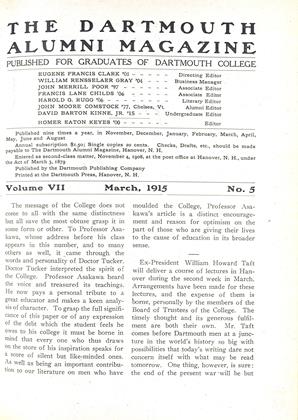By vote of the faculty at its February meeting, a new system of grading for all undergraduate work will be instituted at the beginning of the next college year. The numerical system of grades now in use, by which a student receives a definite figure between 1 and 100 as indicative of the quality of his work in any. given course, will be discarded, and in its place will be substituted a literal system, by which a student's attainments will be indicated to him through one of five letters—A, B, C, D, or E. A signifies work of exceptionally high quality; B work of superior quality, but lower than that denoted by A; C work of medium quality; D work of inferior quality, but above passing; E a failure. Further, with each of these grades is associated a certain number of "points," as follows: A, 4 points per credit hour; B, 3 points per credit hour; C, 2 points per credit hour; D, 1 point per credit hour. In other words, a student passing a course with grade A will receive 4 points for every hour credit to which the course entitles him; and similarly for courses passed with other grades. Grade E gives no credit hours and no points. With this system a student's standing is indicated by a certain number of hours which he has passed and by a certain number of points. The former gives the quantity of work done, the latter indicates the quality. These two numbers together offer adequate means of discrimination between students both for the awarding of honors and for the restriction of the amount of inferior work accepted for graduation. By vote of the faculty, beginning with the class of 1919, the requirement for a bachelor's degree shall be 122 semester hours (the same number as at present) and 220 points, the points being computed according to the plan outlined above.
The object of this change is to secure greater uniformity of marking by various instructors and various departments, and to stimulate further the ambitions of indifferent students. That the former aim will be achieved is undoubted; that the latter may also be accomplished is devoutly to be hoped.
 View Full Issue
View Full Issue
More From This Issue
-
 Article
ArticleWILLIAM JEWETT TUCKER
March 1915 By Kan-Ichi Asakawa '99 -
 Article
ArticlePROBLEMS IN PREPARATORY SCHOOL ATHLETICS
March 1915 By Walter H. Lillard '05 -
 Article
ArticleThe message of the College does not come to all with the same distinctness
March 1915 -
 Article
ArticleALUMNI PUBLICATIONS
March 1915 -
 Class Notes
Class NotesLOCAL ASSOCIATIONS
March 1915 -
 Article
ArticleTWO MEN OF DARTMOUTH
March 1915 By William Byron Forbush '88







